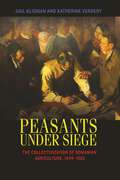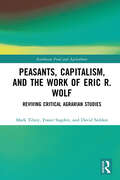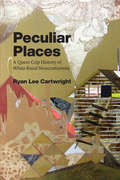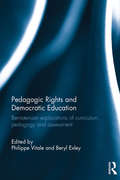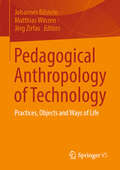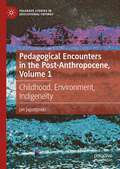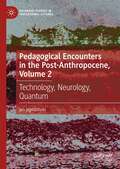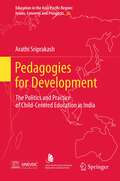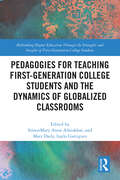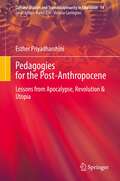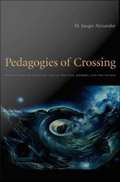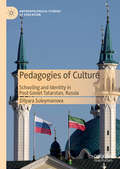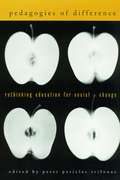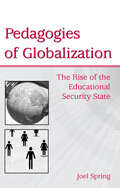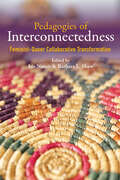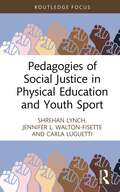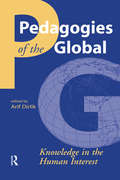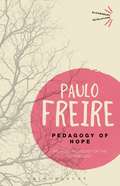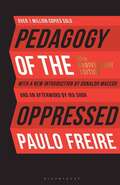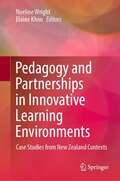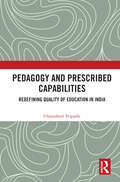- Table View
- List View
Peasants under Siege: The Collectivization of Romanian Agriculture, 1949-1962
by Katherine Verdery Gail KligmanIn 1949, Romania's fledgling communist regime unleashed a radical and brutal campaign to collectivize agriculture in this largely agrarian country, following the Soviet model. Peasants under Siege provides the first comprehensive look at the far-reaching social engineering process that ensued. Gail Kligman and Katherine Verdery examine how collectivization assaulted the very foundations of rural life, transforming village communities that were organized around kinship and status hierarchies into segments of large bureaucratic organizations, forged by the language of "class warfare" yet saturated with vindictive personal struggles. Collectivization not only overturned property relations, the authors argue, but was crucial in creating the Party-state that emerged, its mechanisms of rule, and the "new persons" that were its subjects. The book explores how ill-prepared cadres, themselves unconvinced of collectivization's promises, implemented technologies and pedagogies imported from the Soviet Union through actions that contributed to the excessive use of force, which Party leaders were often unable to control. In addition, the authors show how local responses to the Party's initiatives compelled the regime to modify its plans and negotiate outcomes. Drawing on archival documents, oral histories, and ethnographic data, Peasants under Siege sheds new light on collectivization in the Soviet era and on the complex tensions underlying and constraining political authority.
Peasants, Capitalism, and the Work of Eric R. Wolf: Reviving Critical Agrarian Studies (Earthscan Food and Agriculture)
by David Seddon Mark Tilzey Fraser SugdenFifty years after the publication of Eric Wolf’s celebrated Peasant Wars of the Twentieth Century, and forty years after the publication of his path-breaking Europe and the People Without History, this book offers a much-needed critical assessment and update of Wolf’s contribution to the study of the peasantry and its relationship to capitalism, the state, and imperialism. This book provides a comprehensive evaluation of Wolf’s premises, methodology, and understanding of the peasantry, and its relationship to the rise of capitalism and the modern state. The authors analyse Wolf’s theoretical approach and, by building on his work in Europe and the People Without History especially, argue their own position concerning the dynamics of the peasantry in relation to capitalism, state, class, and imperialism. Further, the text aims to answer the agrarian question more widely, focusing on agrarian society and the political role of the peasantry in contested transitions to capitalism and to modes beyond capitalism. This requires, the authors argue, an analysis of class struggle and of the resources, material and discursive, that different classes can bring to bear on this struggle. Based on well-founded theoretical premises, the book focuses on the contested rise of capitalism in the global North, the development of core–periphery relations in the global political economy, and the place of the peasantry in these dynamics. The book presents case studies of transitions to agrarian capitalism in the British Isles, France, Germany, Japan, and the USA. The book will be of great interest to students and researchers in the areas of peasant studies, rural politics, agrarian studies, development, and political ecology.
Peasants, Political Police, and the Early Soviet State
by Jr. Hugh D. HudsonThis book combines social and institutional histories of Russia, focusing on the secret police and their evolving relationship with the peasantry. Based on an analysis of Cheka/OGPU reports, it argues that the police did not initially respond to peasant resistance to Bolshevik demands simply with the gun rather, they listened to peasant voices. "
Peculiar Places: A Queer Crip History of White Rural Nonconformity
by Ryan Lee CartwrightThe queer recluse, the shambling farmer, the clannish hill folk—white rural populations have long disturbed the American imagination, alternately revered as moral, healthy, and hardworking, and feared as antisocial or socially uncouth. In Peculiar Places, Ryan Lee Cartwright examines the deep archive of these contrary formations, mapping racialized queer and disability histories of white social nonconformity across the rural twentieth-century United States. Sensationalized accounts of white rural communities’ aberrant sexualities, racial intermingling, gender transgressions, and anomalous bodies and minds, which proliferated from the turn of the century, created a national view of the perversity of white rural poverty for the American public. Cartwright contends that these accounts, extracted and estranged from their own ambivalent forum of community gossip, must be read in kind: through a racialized, materialist queercrip optic of the deeply familiar and mundane. Taking in popular science, documentary photography, news media, documentaries, and horror films, Peculiar Places orients itself at the intersections of disability studies, queer studies, and gender studies to illuminate a racialized landscape both profoundly ordinary and familiar.
Peculiar Places: A Queer Crip History of White Rural Nonconformity
by Ryan Lee CartwrightThe queer recluse, the shambling farmer, the clannish hill folk—white rural populations have long disturbed the American imagination, alternately revered as moral, healthy, and hardworking, and feared as antisocial or socially uncouth. In Peculiar Places, Ryan Lee Cartwright examines the deep archive of these contrary formations, mapping racialized queer and disability histories of white social nonconformity across the rural twentieth-century United States. Sensationalized accounts of white rural communities’ aberrant sexualities, racial intermingling, gender transgressions, and anomalous bodies and minds, which proliferated from the turn of the century, created a national view of the perversity of white rural poverty for the American public. Cartwright contends that these accounts, extracted and estranged from their own ambivalent forum of community gossip, must be read in kind: through a racialized, materialist queercrip optic of the deeply familiar and mundane. Taking in popular science, documentary photography, news media, documentaries, and horror films, Peculiar Places orients itself at the intersections of disability studies, queer studies, and gender studies to illuminate a racialized landscape both profoundly ordinary and familiar.
Peculiar Places: A Queer Crip History of White Rural Nonconformity
by Ryan Lee CartwrightThe queer recluse, the shambling farmer, the clannish hill folk—white rural populations have long disturbed the American imagination, alternately revered as moral, healthy, and hardworking, and feared as antisocial or socially uncouth. In Peculiar Places, Ryan Lee Cartwright examines the deep archive of these contrary formations, mapping racialized queer and disability histories of white social nonconformity across the rural twentieth-century United States. Sensationalized accounts of white rural communities’ aberrant sexualities, racial intermingling, gender transgressions, and anomalous bodies and minds, which proliferated from the turn of the century, created a national view of the perversity of white rural poverty for the American public. Cartwright contends that these accounts, extracted and estranged from their own ambivalent forum of community gossip, must be read in kind: through a racialized, materialist queercrip optic of the deeply familiar and mundane. Taking in popular science, documentary photography, news media, documentaries, and horror films, Peculiar Places orients itself at the intersections of disability studies, queer studies, and gender studies to illuminate a racialized landscape both profoundly ordinary and familiar.
Pedagogic Rights and Democratic Education: Bernsteinian explorations of curriculum, pedagogy and assessment
by Philippe Vitale Beryl ExleyThe basis of Bernstein’s sociology of education lays in is his theorisation of the different approaches to curriculum, pedagogy and assessment and the implications for pedagogic rights and social justice. This edited collection presents 15 empirical case studies and theoretical accounts from 22 international scholars who focus on the experiences of students and teachers in contexts marked by economic, social, cultural, linguistic and/or geographic diversity. Located in systems of education in Australia, France, Germany, Greece, Portugal, South Africa and the United States, each chapter contributes to a better understanding of the conditions of a democratic education across time and place.
Pedagogical Anthropology of Technology: Practices, Objects and Ways of Life
by Johannes Bilstein Jörg Zirfas Matthias WinzenThe volume examines the question of which specifically educational techniques are required in view of the increasing establishment and professionalization of pedagogical fields of work. In this context, an attempt is made to clarify what pedagogical and didactic preparation must take place for an increasingly technically oriented world. In addition, the everyday techniques of self-care are analyzed. And finally, pedagogical anthropology is also concerned with the question of who is the subject and object of technology.
Pedagogical Encounters in the Post-Anthropocene, Volume 1: Childhood, Environment, Indigeneity (Palgrave Studies in Educational Futures)
by jan jagodzinskiThis volume, the first of a two volume set, addresses three major areas in response to the post-Anthropocene: childhood, environment and indigeneity. Each of these areas is broadly addressed in relation to the concerns that have arisen both theoretically and educationally. The author terms these to be encounters as each area presents a particular problematic when addressing the phase change that the planet is undergoing where the anthropogenic labour of global humanity is contributing to climate change, endangering our very existence. There has been a concerted effort to overcome the nature-culture divide in education. The author reviews this development in the first section where there has been a particular emphasis placed on childhood education. In the second section he turns to the pedagogical theories that are attempting to overcome this same divide in environmental and science education. The last section attempts to bring into the conversation the vast literature on Indigeneity and their attempts to revise traditional education to meet these extraordinary times.
Pedagogical Encounters in the Post-Anthropocene, Volume 2: Technology, Neurology, Quantum (Palgrave Studies in Educational Futures)
by jan jagodzinskiAs a follow up to Pedagogical Encounters in the Post-Anthropocene, Volume I, this book addresses three major areas in response to the post-Anthropocene: Technology, Neurology, Quantum. Each of these areas is broadly addressed in relation to the concerns that have arisen both theoretically and educationally. As in Volume I, the author terms these to be encounters as each area presents a particular problematic when addressing the phase change that the planet is undergoing where the anthropogenic labour of global humanity is contributing to climate change, endangering our very existence. Technology in education has been a significant development. There is a concerted effort to review this development placing stress on the rise of learning machines and algorithms. In the second encounter the vast literature on neurology is addressed, especially neurodiversity and the various symptoms that have emerged in the post-Anthropocene era. The last section reviews issues related to quantum theory as this is fundamental to tensions between physics and metaphysics. The volume concludes with the author’s own pedagogical proposal for the future.
Pedagogies for Development
by Arathi SriprakashPedagogies for Development takes a sociological approach to examine the introduction of child-centred education in contemporary Indian policy and school contexts. It investigates the promise of democratic learning in development discourses to ask how far child-centred models can address poverty and social inequalities in rural Indian communities. Drawing on in-depth ethnographic research conducted in the south Indian state of Karnataka, the book offers a multi-level analysis of international, national and state education practices of pedagogic reform. The book contributes to pressing debates about how 'quality' education should be conceptualised and assessed in development contexts, and brings into focus the assumptions which associate schooling to social justice.
Pedagogies for Teaching First-Generation College Students and the Dynamics of Globalized Classrooms (Rethinking Higher Education Through the Strengths and Insights of First-Generation College Students)
byThis book examines how higher education institutions positively enhance the learning experiences of first-generation college students. What systems in our communities and world are intentionally or unintentionally producing the realities of first-generation identities, and how can these be upended through a deliberate pedagogical turn? With these questions in mind, this book aims to highlight the relevant and dynamic pedagogical skills and tools that institutions can employ to address the demands of globality and difference in the classroom. Challenging traditional deficit-focused perspectives used to discuss first-generation students, the book highlights alternative strengths-based support methods to improve the experiences and outcomes of first-generation college students. This book will appeal to scholars, researchers, and upper-level students with interests in higher education, cultural studies, philosophy of education, and decolonial studies.
Pedagogies for the Post-Anthropocene: Lessons from Apocalypse, Revolution & Utopia (Cultural Studies and Transdisciplinarity in Education #14)
by Esther PriyadharshiniThis book draws on posthumanist critique and post qualitative approaches to research to examine the pedagogies offered by imaginaries of the future. Starting with the question of how education can be a process for imagining and desiring better futures that can shorten the Anthropocene, it speaks to concerns that are relevant to the fields of education, youth and futures studies. This book explores lessons from the imaginaries of apocalypse, revolution and utopia, drawing on research from youth(ful) perspectives in a context when the narrative of ‘youth despair’ about the future is becoming persistent. It investigates how the imaginary of 'Apocalypse' acts as a frame of intelligibility, a way of making sense of the monstrosities of the present and also instigates desires to act in different ways. Studying the School Climate Strikes of 2019 as 'Revolution' moves us away from the teleologies of capitalist consumption and endless growth to newer aesthetics. The strikes function as a public pedagogy that creates new publics that include life beyond the human. Finally, the book explores how the Utopias of Afrofuturist fiction provides us with a kind of 'investable' utopia because the starting point is in racial, economic and ecological injustice. If the Apocalypse teaches us to recognize what needs to go, and Revolution accepts that living with ‘less than’ is necessary, then this kind of Utopia shows us how becoming ‘more than’ human may be the future.
Pedagogies of Crossing: Meditations on Feminism, Sexual Politics, Memory, and the Sacred
by M. Jacqui AlexanderM. Jacqui Alexander is one of the most important theorists of transnational feminism working today. Pedagogies of Crossing brings together essays she has written over the past decade, uniting her incisive critiques, which have had such a profound impact on feminist, queer, and critical race theories, with some of her more recent work. In this landmark interdisciplinary volume, Alexander points to a number of critical imperatives made all the more urgent by contemporary manifestations of neoimperialism and neocolonialism. Among these are the need for North American feminism and queer studies to take up transnational frameworks that foreground questions of colonialism, political economy, and racial formation; for a thorough re-conceptualization of modernity to account for the heteronormative regulatory practices of modern state formations; and for feminists to wrestle with the spiritual dimensions of experience and the meaning of sacred subjectivity. In these meditations, Alexander deftly unites large, often contradictory, historical processes across time and space. She focuses on the criminalization of queer communities in both the United States and the Caribbean in ways that prompt us to rethink how modernity invents its own traditions; she juxtaposes the political organizing and consciousness of women workers in global factories in Mexico, the Caribbean, and Canada with the pressing need for those in the academic factory to teach for social justice; she reflects on the limits and failures of liberal pluralism; and she presents original and compelling arguments that show how and why transgenerational memory is an indispensable spiritual practice within differently constituted women-of-color communities as it operates as a powerful antidote to oppression. In this multifaceted, visionary book, Alexander maps the terrain of alternative histories and offers new forms of knowledge with which to mold alternative futures.
Pedagogies of Culture: Schooling and Identity in Post-Soviet Tatarstan, Russia (Anthropological Studies of Education)
by Dilyara SuleymanovaThrough an ethnographic study of schooling in the Republic of Tatarstan, this book explores how competing notions of nationhood and belonging are constructed, articulated and negotiated within educational spaces. Amidst major political and ideological moves toward centralization in Russia under the Putin presidency, this small provincial town in Tatarstan provides a unique case of local attempts to promote and preserve minority languages and cultures through education and schooling. Ultimately, the study reveals that while schooling can be an effective instrument of the state to transform individuals as well as society as a whole, school also encompasses various spaces where the agency of local actors unfolds and official messages are contested. Looking at what happens inside schools and beyond—in classrooms, hallways and playgrounds to private households or local Islamic schools—Dilyara Suleymanova here offers a detailed ethnographic account of the way centrally devised educational policies are being received, negotiated and contested on the ground.
Pedagogies of Difference: Rethinking Education for Social Justice
by Peter Pericles TrifonasPeter Pericles Trifonas has assembled internationally acclaimed theorists and educational practitioners whose essays explore various constructions, representations, and uses of difference in educational contexts. These essays strive to bridge competing discourses of difference--for instance, feminist or anti-racist pedagogical models--to create a more inclusive education that adheres to principles of equity and social justice.
Pedagogies of Globalization: The Rise of the Educational Security State (Sociocultural, Political, and Historical Studies in Education)
by Joel SpringIn this ground-breaking book, Joel Spring examines globalization and its worldwide effects on education. A central thesis is that industrial-consumerism is the dominant paradigm in the integration of education and economic planning in modern economic security states.In the twenty-first century, national school systems have similar grades and promotion plans, instructional methods, curriculum organization, and linkages between secondary and higher education. Although there are local variations, the most striking feature is the sameness of educational systems. How did this happen? How was education globalized? Spring explains and analyzes this phenomenon and its consequences for human life and the future improvement of social and economic organizations. Central themes include:*the elements of the educational security state and the industrial-consumer paradigm in relationship to classical forms of education such as Confucianism, Islam, and Christianity, and their concerns with creating a just and ethical society;*the role of the 'other' in the globalization of educational structures as international military and economic rivalries spark competition between educational systems;*the transition from the Confucian village school to Western forms of education as exemplified in the lives of Ho Chi Minh and Mao Zedong;*the effect of the cultural and economic rivalry between the Soviet Union and the United States and its impact on schooling in both countries;*the rise of the educational security state in China, the Soviet Union, and the United States as these countries focus their educational efforts on military and economic development;*the evolution of progressive education as it appeared in revolutionary movements in South America, Cuba, Nicaragua, and El Salvador;*the transition from traditional to Westernized forms of Islamic education against the background of European imperialism, Arab nationalism and wars of liberation, and the uneasy tension between Western educational ideals and Islamic religious values;*socialist education in the Democratic People's Republic of Korea;*current developments in educational security states such as China, Japan, the United States, the new Russia, and the European Union; and*the consequences of English as the global language and the global spread of the industrial-consumer paradigm.Readership for this book includes scholars and students in comparative, international, and multicultural education; educational policy and politics; historical, social, and philosophical foundations of education; and curriculum studies. It is a particularly timely, informative, engaging text for courses in all of these areas.
Pedagogies of Interconnectedness: Feminist-Queer Collaborative Transformation (Transformations: Womanist studies)
by Richard Russo Ariella Rotramel Letizia Guglielmo Sharon R. Wesoky Christine Keating Jeremy Hall María Claudia André M. Gabriela Torres Isis Nusair Andrea N. Baldwin Sara Youngblood Gregory Barbara L. Shaw Kimberly Sanchez Misty De Berry Linh U. Hua K. Melchor Hall Rebecca Dawson Luisa Bieri Meryl Altman Danielle M. DeMuth Ayana K. Weekley Montserrat Pérez-Toribio Charlotte Meehan Emily Fairchild Leen Al-Fatafta Carolyn Beer Jordan Alderman Brayden Milam Andrea PutalaA generation of scholar-teacher-activists have moved beyond collaborating in theory to embodying, engaging in, and sharing how they practice their pedagogy. Isis Nusair and Barbara L. Shaw edit essays that link feminist, queer, anti-racist, decolonial, and disability theory and practice while using intersectional, transnational, and interdisciplinary approaches to explore how the personal remains political. The contributors describe ways of building communities within and beyond academic programs and examine what it means to engage in community-building work and action across institutional boundaries. In Part One, the essayists focus on the centrality of community building and reinterpreting bodies of knowledge with students, staff, faculty, and community members. Part Two looks at bringing transnational approaches to feminist collaborations in ways that challenge the classroom’s central place in knowledge production. Part Three explores organic collaborations in and beyond the classroom. A practical and much-needed resource, Pedagogies of Interconnectedness offers cutting-edge ideas for collaboration in pedagogy, education justice, community-based activities, and liberatory worldmaking. Contributors: Jordyn Alderman, Leen Al-Fatafta, Meryl Altman, María Claudia André, Andrea N. Baldwin, Carolyn Beer, Luisa Bieri, Rebecca Dawson, Misty De Berry, Danielle M. DeMuth, Emily Fairchild, Sara Youngblood Gregory, Letizia Guglielmo, Jeremy Hall, K. Melchor Hall, Linh U. Hua, Christine Keating, Charlotte Meehan, Brayden Milam, Isis Nusair, Montserrat Pérez-Toribio, Andrea Putala, Ariella Rotramel, Ann Russo, Kimberly Sanchez, Barbara L. Shaw, M. Gabriela Torres, Ayana K. Weekley, and Sharon R. Wesoky
Pedagogies of Social Justice in Physical Education and Youth Sport (Routledge Focus on Sport Pedagogy)
by Shrehan Lynch Jennifer L. Walton-Fisette Carla LuguettiThis book offers an overview of contemporary debates in social justice and equity within Physical Education (PE) and Youth Sport (YS). It gives the reader clear direction on how to evaluate their current PE or YS program against current research and provides ideas for content, curriculum development, implementation, and pedagogical impact. The book addresses key contemporary issues including healthism, sexism, racism, classism, heterosexism, ableism and colonialism, and it highlights the importance of positionality and critical awareness on the part of the teacher, coach, or researcher. Presenting an array of case studies, practical examples, and thought-provoking questions, the book discusses equitable pedagogies and how they might be implemented, including in curriculum design and assessment. Concise, and avoiding academic jargon, this is an invaluable guide for pre-service and in-service teachers, teacher educators, coaches, and educators, helping them to ensure that all students and young people are included within the PE and YS settings for which they are responsible.
Pedagogies of the Global: Knowledge in the Human Interest
by Arif DirlikThe essays in this collection address questions raised by a modernity that has become global with the victory of capitalism over its competitors in the late twentieth century. Rather than erase difference by converting all to European-American norms of modernity, capitalist modernity as it has gone global has empowered societies once condemned to imprisonment in premodernity or tradition to make their own claims on modernity, on the basis of those very traditions, as filtered through experiences of colonialism, neocolonialism, or simple marginalization by the forces of globalization. Global modernity appears presently not as global homogeneity, but as a site of conflict between forces of homogenization and heterogenization within and between nations. Prominent in this context are conflicts over different ways of knowing and organizing the world. The essays here, dealing for the most part with education in the United States, engage in critiques of hegemonic ways of knowing and critically evaluate counterhegemonic voices for change that are heard from a broad spectrum of social, ethnic, and indigenous perspectives. Crucial to the essays' critique of hegemony in contemporary pedagogy is an effort shared by the contributors, distinguished scholars in their various fields, to overcome area and/or disciplinary boundaries and take the wholeness of everyday life as their point of departure.
Pedagogy Of Hope
by Paulo FreireWith the publication of Pedagogy of the Oppressed, Paulo Freire established himself as one of the most important and radical educational thinkers of his time. In Pedagogy of Hope, Freire revisits the themes of his masterpiece, the real world contexts that inspired them and their impact in that very world. Freire's abiding concern for social justice and education in the developing world remains as timely and as inspiring as ever, and is shaped by both his rigorous intellect and his boundless compassion. Pedagogy of Hope is a testimonial to the inner vitality of generations denied prosperity and to the often-silent, generous strength of millions throughout the world who refuse to let hope be extinguished.
Pedagogy Of The Oppressed: 50th Anniversary Edition
by Paulo Freire Donaldo MacedoFirst published in Portuguese in 1968, Pedagogy of the Oppressed was translated and published in English in 1970. Paulo Freire's work has helped to empower countless people throughout the world and has taken on special urgency in the United States and Western Europe, where the creation of a permanent underclass among the underprivileged and minorities in cities and urban centers is ongoing. This 50th anniversary edition includes an updated introduction by Donaldo Macedo, a new afterword by Ira Shor and interviews with Marina Aparicio Barberán, Noam Chomsky, Ramón Flecha, Gustavo Fischman, Ronald David Glass, Valerie Kinloch, Peter Mayo, Peter McLaren and Margo Okazawa-Rey to inspire a new generation of educators, students, and general readers for years to come.
Pedagogy and Partnerships in Innovative Learning Environments: Case Studies from New Zealand Contexts
by Elaine Khoo Noeline WrightThis book examines contexts and possibilities in Aotearoa New Zealand education contexts arising from the international trend for open, flexible, innovative learning environments (ILE), specifically on the pedagogical load. The book responds to questions such as: What does it mean to teach, learn or lead in an innovative learning environment? What happens when teachers move form single cell learning spaces to open, collaborative ones?The chapters provide examples of how teaching in new spaces can be an exciting challenge for teachers and students where they try new ways of teaching and learning, and rethink the purposes of learning and the implications of societal change for learning and what is valued. Examples are drawn from pre-service teachers working in primary and secondary schools and in-service teachers learning to become professionals.The book offers insights into a variety of educational contexts where teachers and students learn and adapt to new learning spaces, and also how different teaching and learning partnerships may be conceived, and flourish. It focuses attention on a range of aspects that teachers, school leaders, and other educators, and researchers may find valuable when they embark on similar initiatives to consider issues pivotal to productive and effective innovative learning environment design, development and implementation.
Pedagogy and Prescribed Capabilities: Redefining Quality of Education in India
by Charusheel TripathiThis book questions the validity and reliability of conventional measures of quality education, such as enrolment ratio, retention rates, pupil–teacher ratio, drop-out rates, learning outcomes of children in foundational literacy and arithmetic and availability of infrastructural facilities, henceforth demanding its re-calibration. It moves away from easily commensurable indicators and actively pursues descriptive indicators of quality, which directly focus on educational processes taking place within the classroom and the factors influencing them.By interacting with the two primary stakeholders, i.e. teachers and students, this book draws a link between what is happening within classrooms vis-à-vis the macro-level governmental policies. The strength of the book lies in its methodological approach to understanding whether students and teachers are able to actualize their capabilities, as pledged to them under official educational programmes. By doing so, the author deems to alter the narrative of how quality of education is visualized, hoping that these revelations have developmental implications for not only India but also the entire international community engaging with the questions of ‘what’ and ‘how’ of quality in school education. In a nutshell, the book endeavours to find out how teachers and students fare in terms of realization of their prescribed capabilities.This book would be useful to students, researchers and teachers working in the fields of education, psychology, development studies, policy studies, social work and sociology. It would also be an invaluable companion to policymakers and professionals, from governmental and non-governmental organizations, working in education and social development.
Pedagogy at the End of the World: Weird Pedagogies for Unthought Educational Futures (Palgrave Studies in Educational Futures)
by jessie l. beierThis book interrogates the ways in which “end of the world” thinking has come to define and delimit pedagogical approaches in Anthropocene times. Chapters unfold through a series of speculative studies of educational futurity—sustainable futures, energy futures, working futures—each of which is positioned as an experimental site for probing the limits of pedagogical unthinkability so as to speculate, through concept creation, on unthought educational trajectories. Specifically, the book is oriented towards the creation of pedagogical concepts that work to problematize and resituate questions of educational futurity in relation to the planetary realities raised by today’s pressing extinction events. It is from this experimentation that a weird pedagogy emerges, that is, an experimental pedagogical anti-model, a speculative program for the unprogrammable that seeks to counter-actualize potentials of and for unthinking pedagogy at the (so-called) end of the world.
